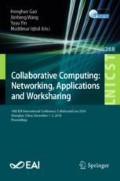Abstract
In online collaboration, instead of the objective strength of social relationship, recent study reveals that the two participants can have different subjective opinions on the relationship between them, and the opinion can be investigated with their interactive language on this relationship. However, two participants’ bidirectional opinions in collaboration is not only determined by their interaction on this relationship, but also influenced by the adjacent third-party partners. In this work, we define the two participants’ opinions as the subjective strength of their relationship. To measure the bidirectional subjective strength of a social relationship, we propose a computational model synthetizing the features from participants’ interactive language and the adjacent balance in social network. Experimental results on real collaboration in Enron email dataset verify the effectiveness of the proposed model.
Access this chapter
Tax calculation will be finalised at checkout
Purchases are for personal use only
References
Aggarwal, C.C.: Social Network Data Analytics. Springer, Heidelberg (2011). https://doi.org/10.1007/978-1-4419-8462-3
Wang, B., Yu, Y.S., Zhang, P.: Investigation of the subjective asymmetry of social interrelationship with interactive language. In: International Conference on World Wide Web (2016)
Sundararajan, A.: The Sharing Economy: The End of Employment and the Rise of Crowd-Based Capitalism. The MIT Press, Cambridge (2016)
Granovetter, M.S.: The strength of weak ties. J. Soc. 78, 1360–1380 (1973)
Sintos, S., Tsaparas, P.: Using strong triadic closure to characterize ties in social networks. In: Proceedings of the 20th ACM SIGKDD International Conference on Knowledge Discovery and Data Mining, pp. 1466–1475. ACM (2014)
Xiang, R., Neville, J., Rogati, M.: Modeling relationship strength in online social networks. In: International Conference on World Wide Web, pp. 981–990. WWW 2010, Raleigh, North Carolina, USA (2010)
Zhuang, J., Mei, T., Hoi, S.C., Hua, X.S., Li, S.: Modeling social strength in social media community via kernel-based learning. In: Proceedings of the 19th ACM International Conference on Multimedia, pp. 113–122. ACM (2009)
Kahanda, I., Neville, J.: Using Transactional Information to Predict Link Strength in Online Social Networks. In: International Conference on Weblogs and Social Media, ICWSM 2009, San Jose, California, USA (2009)
Adali, S., Sisenda, F., Magdon-Ismail, M.: Actions speak as loud as words: Predicting relationships from social behavior data. In: Proceedings of the 21st International Conference on World Wide Web, pp. 689–698. ACM (2012)
Leskovec, J., Huttenlocher, D., Kleinberg, J.: Predicting positive and negative links in online social networks. In: Proceedings of the 19th International Conference on World wide web, pp. 641–650. ACM (2010)
West, R., Paskov, H. S., Leskovec, J., Potts, C.: Exploiting social network structure for person-to-person sentiment analysis. J. Epr. Arx. (2014)
Bramsen, P., Escobar-Molano, M., Patel, A., Alonso, R.: Extracting social power relationships from natural language. In: Proceedings of the 49th Annual Meeting of the Association for Computational Linguistics Human Language Technologies, vol. 1, pp. 773–782 (2011)
Thomas, M., Pang, B., Lee, L.: Get out the vote: determining support or opposition from congressional floor-debate transcripts. In: Proceedings of the 2006 Conference on Empirical Methods in Natural Language Processing, pp. 327–335 (2006)
Pang, B., Lee, L.: A sentimental education: sentiment analysis using subjectivity summarization based on minimum cuts. In: Proceedings of the 42nd Annual Meeting on Association for Computational Linguistics, p. 271 (2004)
Tan, C., Lee, L., Tang, J., Jiang, L., Zhou, M., Li, P.: User-level sentiment analysis incorporating social networks. In: Proceedings of the 17th ACM SIGKDD International Conference on Knowledge Discovery and Data Mining, pp. 1397–1405 (2011)
Ma, H., Zhou, D., Liu, C., Lyu, M.R., King, I.: Recommender systems with social regularization. In: Proceedings of the Fourth ACM International Conference on Web Search and Data Mining, pp. 287–296 (2011)
Huang, B., Kimmig, A., Getoor, L., Golbeck, J.: A flexible framework for probabilistic models of social trust. In: Greenberg, Ariel M., Kennedy, William G., Bos, Nathan D. (eds.) SBP 2013. LNCS, vol. 7812, pp. 265–273. Springer, Heidelberg (2013). https://doi.org/10.1007/978-3-642-37210-0_29
Habermas, J., McCarthy, T.: The Theory of Communicative Action. Beacon Press, Boston (1985)
Sapir, E.: The status of linguistics as a science. J. Lan. 195–197 (1929)
Holmes, J., Meyerhoff, M., Meyerhoff, M., Mullany, L., Stockwell, P., Llamas, C., et al.: An Introduction to Sociolinguistics, 4th edn. Routledge, London, New York (2013)
Heider, F.: The Psychology of Interpersonal Relations. Psychology Press, London (2013)
Wang, B., Sun, Y.J., Han, B., Hou, Y.X., Song, D.W.: Extending the balance theory by measuring bidirectional opinions with interactive language. In: International Conference on World Wide Web (2017)
Agarwal, A., Omuya, A., Harnly, A., Rambow, O.: A comprehensive gold standard for the Enron organizational hierarchy. In: Proceedings of the 50th Annual Meeting of the Association for Computational Linguistics, pp. 161–165. Association for Computational Linguistics (2012)
Acknowledgments
This work is supported by National Natural Science Foundation of China (U1736103), National Natural Science Foundation of China (Key Program, U1636203), the state key development program of China (2017YFE0111900) and National Natural Science Foundation of China (61472277).
Author information
Authors and Affiliations
Corresponding author
Editor information
Editors and Affiliations
Rights and permissions
Copyright information
© 2019 ICST Institute for Computer Sciences, Social Informatics and Telecommunications Engineering
About this paper
Cite this paper
Xue, B., Wang, B., Yu, Y., He, R., Hou, Y., Song, D. (2019). Measuring Bidirectional Subjective Strength of Online Social Relationship by Synthetizing the Interactive Language Features and Social Balance (Short Paper). In: Gao, H., Wang, X., Yin, Y., Iqbal, M. (eds) Collaborative Computing: Networking, Applications and Worksharing. CollaborateCom 2018. Lecture Notes of the Institute for Computer Sciences, Social Informatics and Telecommunications Engineering, vol 268. Springer, Cham. https://doi.org/10.1007/978-3-030-12981-1_7
Download citation
DOI: https://doi.org/10.1007/978-3-030-12981-1_7
Published:
Publisher Name: Springer, Cham
Print ISBN: 978-3-030-12980-4
Online ISBN: 978-3-030-12981-1
eBook Packages: Computer ScienceComputer Science (R0)

